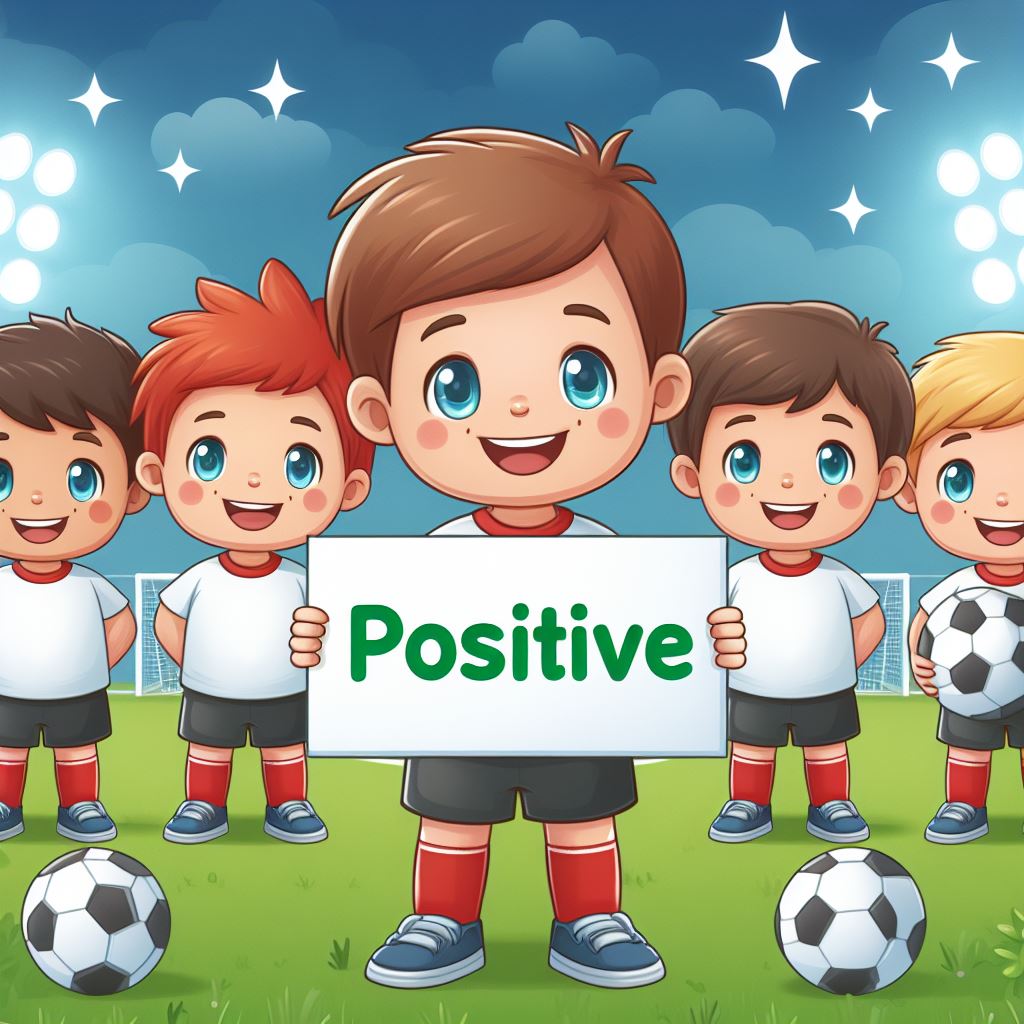I’m going to show you why a positive environment isn’t just a nice-to-have in kids’ soccer—it’s a cornerstone. You see, when we talk about youth sports, we often focus on the physical benefits: agility, strength, coordination. But there’s an equally critical piece that doesn’t always make the headlines: the psychological and emotional well-being of young players.
That’s going to include tapping into how an uplifting soccer environment boosts a child’s self-esteem. It’s about helping them believe in their abilities and value their contributions, leading to stronger teamwork skills. Just don’t focus too much on the scoreboard—these are the real wins that shape character and confidence.
You’re going to find out about how positive experiences in soccer can spark a lifelong passion for the game. But more than that, it’s also about teaching resilience. In my opinion, the way kids learn to navigate wins, losses, and everything in between sets the stage for handling life’s challenges.
Choose something that resonates with you, and you can instill it in young players. Maybe it’s the joy in a high-five after a great play, or the lessons learned in a post-game huddle. Create those moments, and you’ll see a team that grows not only in skills but in spirit as well.
Creating the Right Atmosphere: The Role of Coaches and Parents
You might have heard the saying, ‘It takes a village to raise a child.’ Well, in the world of youth soccer, that village is made up primarily of coaches and parents. In my opinion, their roles are absolutely critical in shaping not just the soccer skills, but the overall well-being of young players.
Coaches have a special position when it comes to youth sports. A good coach doesn’t just focus on the scoreboard; they prioritize personal and athletic growth. Choosing a child-centric coaching philosophy means coaches should celebrate individual milestones and improvements, regardless of the game’s outcome. This isn’t just about making better soccer players, it’s also about building confident individuals.
What about parents? They’re the cheerleaders on the sidelines, but their involvement goes beyond the game day. Encouraging positive behavior, maintaining a healthy balance between support and pressure, and reinforcing the coach’s messages are all part of creating that positive environment. Remember, kids often take cues from adults, so displaying positive emotions like enthusiasm and resilience can be infectious.
Sure, winning is exciting, but don’t worry too much about always finishing first. The real win is seeing kids come off the pitch with a big smile, eager for the next game. It’s all about fostering a love for soccer and a healthy competitive spirit, without making the sport feel like a job.
You’re going to find out about incorporating fun drills and maintaining adaptability in training sessions as we talk about how to build skills in the next section. Stay tuned, because that’s where we bring this supportive atmosphere into the day-to-day development of young soccer enthusiasts.
Building Skills in a Supportive Environment: Training and Practice Tips
I’m going to unpack some game-changing strategies for nurturing young players’ soccer skills in a way that’s both effective and caring. First and foremost, training should be FUN. With creative, age-appropriate soccer drills, children not only improve their techniques but also remain excited and passionate about the game.
When you’re planning practice sessions, the word to keep in front of mind is ‘adaptability’. Kids develop at their own pace, so customizable training activities can be a game-changer. This means occasionally adjusting the difficulty level or the approach based on the children’s reactions and feedback.
Team spirit isn’t just a buzzword; it’s the bedrock of a supportive soccer environment. I’m here to help you weave teamwork into every exercise. Whether it’s through partner drills or team challenges, emphasize the value of working together. And when the team pulls off a win, whether in a small scrimmage or a skill-building game, celebrate everyone’s contributions, not just the star players’.
Now, let’s talk about what’s often glossed over: emotional and mental support. During training, always be on the lookout for moments to provide encouragement and build resilience. If a player makes a mistake, frame it as a learning opportunity. Encourage them to try again, and keep the atmosphere positive and pressure-free.
Beyond the Field: Fostering a Holistic Developmental Approach
I’m here to help you with grasping the importance of nurturing young athletes beyond the soccer pitch. In this journey, you’re going to find out that development is not only about skills on the field but also about cultivating a resilient and healthy lifestyle.
Nutrition takes center stage when we talk about the overall development of kids in soccer. A balanced diet fuels their energy levels and improves recovery time, making each game and practice more effective. It’s not just about carbs and protein; it’s about teaching kids to make smart choices for their bodies.
I’m going to stress the significance of rest, too. Adequate sleep is essential for learning, memory consolidation, and physical growth. It may not be immediately apparent, but sleep quality can directly affect a child’s performance and enjoyment of the sport.
Now, sportsmanship and respect are cornerstones of a positive soccer environment. Cultivating these values early on ensures children learn to win with humility and lose with grace, a set of skills valuable throughout life, not just in sports.
And don’t worry too much about your kids’ soccer practice consuming all their time. Balancing soccer with social activities and school empowers kids to become well-rounded individuals. It’s all about integration, not isolation.
Choose something that resonates with the children’s interests when integrating education and social learning into their soccer experience. Maybe it’s a passion for a subject that can be tied to sports or friendships that help them develop teamwork and communication off the pitch.
In my opinion, guiding children to see the bigger picture helps them appreciate the broader spectrum of their development. And guess what? They are more likely to stick with soccer when they see it as a part of their life, not all of it.
Your first attempt at creating this holistic environment doesn’t need to be your last. You can always adjust your approach down the road based on the kids’ evolving needs and interests.
I really hope that you bring these insights into your practice to help craft not only better soccer players but also healthier, happier, and more balanced kids. That’s the strategy I like to leverage for positive and impactful soccer development.





The essay is likely to be useful to parents, coaches, and young players interested in youth soccer, which is extremely important to me because my child plays in it. It highlights the significance of creating a supportive and encouraging environment that promotes skill development, teamwork, and enjoyment. This material may be valuable to anyone looking to improve the youth soccer experience and develop a nice learning atmosphere for young players, which I believe is vital since if a youngster does not love it the first time, they are unlikely to return. Thank you for sharing.
Yes, I agree they must love it. Thank you for sharing also!
Hello!
This article could have been used by my parents and teachers for sure. We played a looot of soccer with my friends when we were kids, but the environment wasn’t always positive. The competitiveness often took over our emotions, and that’s just how kids are.
This kind of healthy supervision and adjustments to the environment would’ve been helpful for a more positive experience.
Thanks for sharing!
I agree with 100 percent! We need more positivity in sports. It’s so easy to get caught up in the competitiveness of it all. You are right, that is how kids are. As adults, we’ve got to do better. Thanks for your comment!
This article is a beacon of guidance for parents and coaches alike, emphasizing the importance of nurturing young athletes in a supportive atmosphere. By prioritizing positivity, encouragement, and constructive feedback, this article underscores the vital role adults play in shaping children’s soccer experiences. It’s a refreshing reminder that success in sports isn’t just about skills on the field but also about fostering a love for the game and instilling values that extend beyond the pitch. A must-read for anyone involved in youth soccer, as it lays the groundwork for a fulfilling and enriching journey for young players.
I’m so glad you enjoyed the article. Well said, I hope others will read and feel the same way. Thanks for your comment and enjoy your day!
Hi there
While I can’t personally offer my experiences on this topic as I do not have my own kids. I can say that I agree that creating a positive environment for kids’ soccer development is not just beneficial; it’s essential for their growth and enjoyment in the sport.
Your article rightly emphasizes the significance of fostering a supportive atmosphere where children can thrive both athletically and personally. From instilling confidence to promoting teamwork and resilience, such an environment nurtures not just soccer skills but also crucial life lessons.
By prioritizing encouragement over criticism and emphasizing fun alongside learning, coaches and parents can truly empower young players to reach their full potential and develop a lifelong love for the beautiful game.
Well done
Children in today’s world need more positive environments. There are many cases where youth sports can become a toxic place. I hope to spread more positivity and love for the sport.
Thanks for your comment! Cheers!
Hello Ty,
Thank you, Ty, for sharing such valuable insights into creating a positive environment for kids’ soccer development. Your emphasis on the psychological and emotional well-being of young players alongside their physical skills is crucial. It is refreshing to see a focus on building confidence, resilience and a lifelong passion for the game rather than just chasing wins on the scoreboard.
Your advice for coaches and parents underscores the importance of their roles in shaping not only soccer skills but also the overall well-being of children. Celebrating individual milestones, maintaining positivity, and fostering teamwork are key components in creating a supportive atmosphere where kids can thrive.
I’m so glad you enjoyed and I appreciate you stopping by to read. I hope to keep spreading positivity and encouragement, especially for our youths. Thanks for your comment!